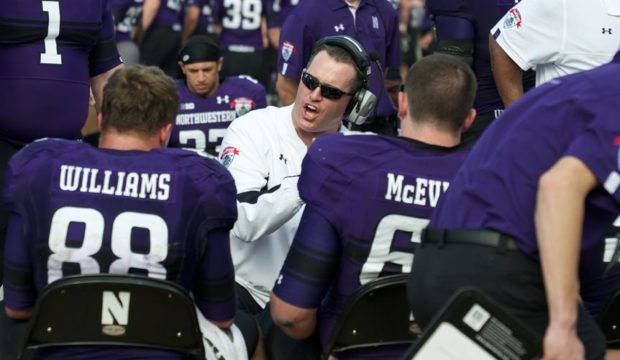Every team faces circumstances each season that test the bonds of brotherhood. If left unchecked, and if the wounds of player dissent begin to fester, they can lead to a team-wide attitude infection that derails an entire season.
Northwestern University head coach Pat Fitzgerald faced just such a challenge. Following a breakthrough 2012 campaign where the Wildcats finished 10-3 with a Gator Bowl victory, the future looked bright for the Wildcats. In 2013, however, Northwestern struggled, finishing 5-7.
Link to original article in AFCA Weekly by Mike Podoll, Associate Publisher, This Is AFCA Magazine.
On top of that, a group of Wildcat football players started the process toward unionization and the story caught fire with the national media. Prior to spring football two years ago, the unionization topic within collegiate sports leapt to the national forefront as teammates participated in a hotly debated vote on unionization. It has since subsided, largely because of a ruling against the Northwestern players on the issue of unionization.
At the time, though, Northwestern was a team of players who were split on this potentially groundbreaking issue within college athletics. Fitzgerald found himself in the position of having to pull his team together, and get them to focus on working hard to become a unified team that represented Northwestern University with honor.
The Wildcats head coach reached deep within himself to deal with the situation.
“Any time that you’re faced with something that’s out of your control, you revert back to your coaching plan, and you revert back to why you got into this profession in the first place,” says Fitzgerald. “As coach, you must work to help your players through any situation that may arise.
“Being a coach means that you’re part educator, part role model, part teacher, part mentor, part father figure, part professional developer – it’s all that – and much more. That’s exactly the mindset our staff approached this situation with.”
The Northwestern coach says that there were unique rules and legal guidelines that he and his staff needed to learn early in the process, but through it all, they never forgot about their core reasons for coaching.
“When a coaching staff gets hit with something of this magnitude, you’re sort of blindsided by it, and when the media attention suddenly comes flooding in, you learn to quickly utilize every resource at your disposal,” says Fitzgerald. “So from things such as communicating with your athletic administration, the university administration, the legal counsel – all those types of things – you learn to prepare as a staff and streamline the communication.
“From there, you’ve got to digest all the information, organize everything and make sure it is disseminated properly.”
Adding to the pressure of this situation was the fact that Fitzgerald was coming off a disappointing season, and he knew they had little time to waste.
“After the season we had in 2013, there was a terrific sense of urgency here to turn things around and get back to where we’ve been – and that’s competing for championships,” says Fitzgerald. “I’m proud to say that we have worked hard at that every day.
“One of our biggest goals as a coaching staff is that we strive to be the best player-development staff in the country. I’m happy to say that what has happened here has had zero net impact on that vision.
“Ultimately, we had to prioritize how we were going to deal with the union issue and then get back to the Northwestern way of working hard to improve. And to the credit of our players – every day that they have been here, since this whole issue surfaced – their focus has been on improving as a team.”
Fitzgerald admits that, as a coach, invariably things will happen that are out of your control. It’s not so much about the things that happen to you; rather, what do you do about them?
“How you handle adversity is truly the hallmark of a great leader, and historically, it’s been the hallmark of great teams,” says Fitzgerald. “It was fascinating. There are players stepping up on this team – that maybe without going through all of this – they might not have done that.
“When you are part of a team, sometimes you have to agree to disagree and move on. That’s what men do and that’s OK, as long as there’s one vision moving forward.”
Fitzgerald also points to a close relationship that his football team has formed with a group of Navy SEALs. Their special forces mantra of “Team, Teammates and Self” has played a huge role in pulling the program together.
“If you believe in the Navy SEAL credo, the plan to work builds itself,” says Fitzgerald. “But if you think that your personal opinion is more important than that of the team, then not only are you not helping the team, but you are actually hurting it.
“It’s about the team. It’s about being a servant leader. It’s about giving of yourself for the betterment of your teammates. If you have those priorities straight, then ultimately, it will benefit you in the long run. At the end of the day, this situation served as a catalyst for helping us to become one of the most unified teams to have ever assembled here at Northwestern.”
Mike Podoll is the Associate Publisher of This Is AFCA magazine. For comments and questions, contact him at mpodoll@threecyclemedia.com. Follow Mike Podoll on Twitter @fcdaily_podoll.

